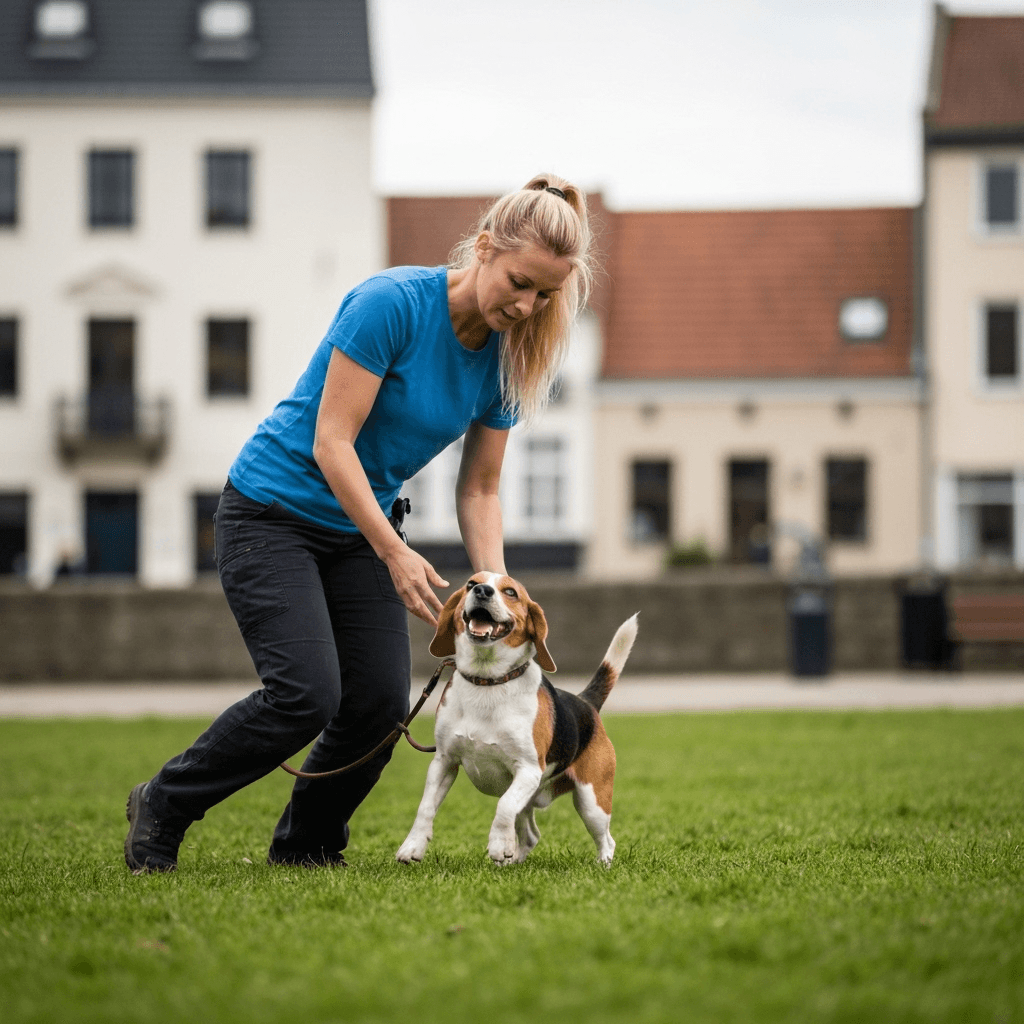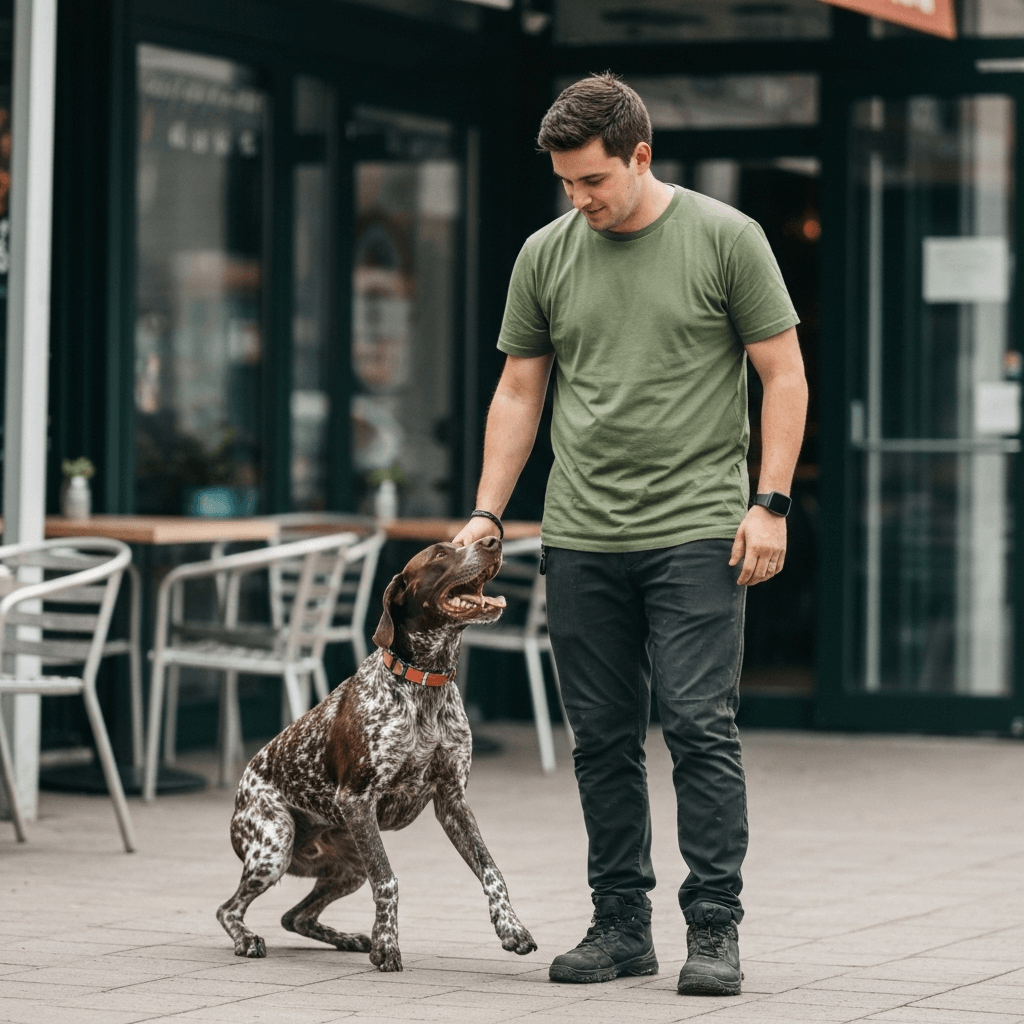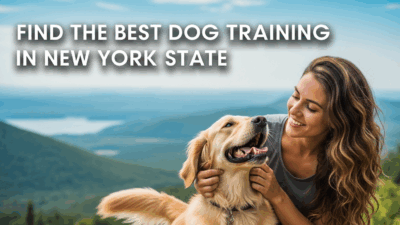Your Complete Guide to Choosing a Dog Trainer in New York State
New York State presents unique challenges for dog owners, from navigating dense urban environments in cities like New York City and Buffalo to managing rural trails in the Adirondacks and Catskills. Whether you’re working on recall skills at a Hudson Valley park or teaching your dog to ignore distractions on busy Brooklyn streets, finding the right professional dog trainer matters.
New York has diverse regulations that vary by municipality, so working with someone who understands both state laws and local ordinances will save you frustration. Your dog needs skills that work for your specific lifestyle, whether that means apartment living, suburban neighborhoods, or countryside properties.
How to Choose the Right Trainer
Look for trainers who use positive reinforcement training and can customize their approach to your dog’s personality and your daily routine. Your training program should address the real situations you face, like crowded subway platforms, encounters with wildlife on hiking trails, or staying calm during city street festivals.
Credentials give you a starting point for evaluating experience and education. Common dog trainer certifications include CPDT-KA, KPA-CTP, and IAABC-CDBC for complex behavior issues. If your dog shows serious aggression or fear, look for a certified dog trainer with CBCC-KA credentials or advanced behavior modification training.
In-home dog training works well for door manners, separation anxiety, and preparing for neighborhood walks. Group classes make sense once your dog can handle moderate distractions, especially if you need practice in controlled environments before tackling busier public spaces.
Board and train programs can accelerate learning if you’re dealing with time constraints, but make sure you understand how the trainer will teach you to maintain the progress. Without proper follow-through coaching, even the best results can fade quickly.
Common Dog Training Methods Explained

Positive reinforcement builds the kind of trust and confidence that helps dogs succeed in New York’s varied environments. Reward-based methods also reduce stress for both you and your dog while creating behaviors that last.
Basic obedience covers sit, down, stay, place, recall, and leash training so your dog can handle everything from apartment hallways to farmers markets. These foundation skills make daily life easier and help you follow local regulations about keeping dogs under control.
Puppy training focuses on socialization, potty training, crate comfort, bite inhibition, and early leash manners. Starting young prevents problems from developing and gives your puppy positive experiences with the sights and sounds they’ll encounter throughout their life.
Behavior modification addresses reactivity, fear, resource guarding, or separation anxiety through careful desensitization and counterconditioning. For serious cases, many trainers collaborate with veterinary behaviorists to create comprehensive treatment plans.
Private lessons and in-home sessions let you work on specific problems in the exact locations where they happen. Day training offers an option where the trainer works with your dog during the day and then coaches you on maintaining the skills.
Dog training classes and group classes help your dog learn to focus around other animals and people. Quality classes maintain appropriate spacing, screen participants carefully, and emphasize calm behavior rather than just excitement.
Service dog training and therapy dog training require structured programs with public-access skills and strict behavior standards. These specialized paths need trainers with experience in the specific legal requirements and temperament testing involved.
Avoid trainers who rely on fear, pain, or intimidation. These methods create unnecessary stress, can damage your relationship with your dog, and often lead to unpredictable behavior that makes following local regulations harder.
Average Cost of Dog Training in New York State (Updated for 2025)
Pricing varies significantly across New York State depending on location, trainer experience, and whether you’re in a major metropolitan area or smaller community. Urban areas like New York City, Buffalo, and Albany typically see higher rates than rural regions.
| Service Type | Average Cost (New York State) |
|---|---|
| Puppy classes (4-6 weeks) | $175-$350 total |
| Group obedience classes (4-6 weeks) | $180-$375 total |
| Private lessons (60-90 min) | $125-$225 per session |
| In-home coaching packages (4-6 visits) | $500-$1,100 total |
| Day training (per week) | $500-$1,200 |
| Behavior consult (initial) | $175-$300 |
| Board and train (2-4 weeks) | $2,200-$5,500 total |
Metropolitan areas often charge 20-40% more than these averages, while rural trainers may offer lower rates. Travel fees apply for longer distances, and complex behavior work typically costs more than basic obedience.
Ask about what’s included in packages, how progress gets tracked, and whether the trainer offers a free consultation or free evaluation to ensure you’re a good fit before committing to a full program.
Questions to Ask a Potential Dog Trainer
- What training methods do you use, and how do you keep sessions positive and low-stress?
- What credentials do you hold, like CPDT-KSA or CTC, and how do you stay current with continuing education?
- How will you customize the training plan for my dog’s specific needs and our New York lifestyle?
- Do you offer private lessons, group classes, or day training, and which approach fits my situation best?
- How will we measure progress and know when to increase difficulty or add distractions?
- What are the total costs including any travel fees, and what’s your cancellation policy?
- Do you carry liability insurance, and can you provide proof?
- For behavior issues, will you work with my veterinarian or a veterinary behaviorist if needed?
- What homework will I need to do between training sessions to help my dog improve?
- How do you handle dogs who are fearful or reactive during sessions?
New York State Rules and Considerations
New York State maintains regulations that affect how you manage your dog in public spaces, though specific enforcement varies by municipality. Understanding both state and local rules helps you train appropriately and avoid legal problems.
New York State Agriculture and Markets Law Section 109 requires dogs to be licensed annually in most municipalities. Check with your county clerk or local government office for specific licensing requirements and fees in your area.
Leash laws vary by location throughout the state. Most cities and villages require leashes in public spaces, while some towns have different rules for rural areas. New York City requires leashes no longer than six feet in most public areas, with designated off-leash hours in certain parks.
New York State requires current rabies vaccination for all dogs over four months old, administered by a licensed veterinarian. Keep your dog’s rabies certificate accessible and ensure they wear their rabies tag when in public.
Excessive barking and other nuisance behaviors can result in complaints and fines under local ordinances. Working with a trainer on alert barking, separation anxiety, and reactivity protects your relationship with neighbors and prevents legal issues.
New York State doesn’t require specific licenses for dog trainers, though they must follow standard business regulations. Facilities that board dogs for payment may need permits from the New York State Department of Agriculture and Markets under Article 7 of the Agriculture and Markets Law.
Insurance requirements for dog training services vary, but reputable trainers carry general liability coverage to protect both themselves and their clients. Always ask to see proof of insurance before starting any training program.
Local New York State Resources for Dog Owners
These locations throughout New York State offer opportunities to practice training, provide enrichment, and help your dog become a well-behaved companion. Always follow posted rules and practice good etiquette.
- Prospect Park Dog Beach in Brooklyn provides off-leash areas and water access for socialization and recall practice
- Ellicott Island Park Dog Park in Tonawanda offers fenced spaces near Buffalo for safe off-leash training
- Madison Square Park Dog Run in Manhattan gives urban dogs a chance to practice calm behavior in a controlled setting
- Saratoga Spa State Park welcomes leashed dogs on trails, perfect for building focus around wildlife and other visitors
- Walkway Over the Hudson State Historic Park in Poughkeepsie allows leashed dogs and provides excellent distractions for loose-leash training
- Robert Moses State Park on Long Island offers beach access where leashed dogs can practice around water, birds, and beachgoers
Many New York municipalities maintain their own dog parks and off-leash areas with specific rules about hours, vaccination requirements, and permits. Check with your local parks department for up-to-date information about facilities near you.

FAQs
How much does in-home dog training cost?
Most trainers across New York State charge $125-$225 per private session, with urban areas typically at the higher end. Package deals for four to six sessions often reduce the per-visit cost by 10-20%.
Is in-home dog training worth it?
Absolutely, because you’re addressing problems in the exact environment where they occur. Your trainer can work on door reactivity, counter-surfing, jumping on guests, and barking at window stimuli right where they happen, then transition to practicing leash skills on your actual walking routes.
Can you pay someone to house train your dog?
Yes, many dog training services include potty training as part of puppy programs or day training packages. The trainer teaches your dog the routine and helps you understand the schedule and signals to maintain consistency.
What is the 3-3-3 rule for dog training?
This guideline helps set realistic expectations for newly adopted dogs. Plan for about three days of decompression, three weeks to learn your routines, and three months to feel fully settled. Expert dog trainers design programs that respect this natural adjustment timeline.
How long will it take to reach my training goals?
Most puppies and friendly adult dogs show solid progress in 4-8 weeks with consistent practice between training sessions. Fear-based behaviors, reactivity, and aggression typically require several months of careful behavior modification with gradual increases in difficulty and distractions.
What should I bring to group classes?
Pack a flat collar or harness, a standard 6-foot leash, high-value treats your dog loves, water, and current vaccination records if requested. Leave retractable leashes and prong collars at home for safety and to comply with most class policies.
What’s the leash law in New York State?
Leash requirements vary by municipality throughout New York State. Most urban and suburban areas require dogs to be leashed in public spaces, while some rural towns have different regulations. Check your local ordinances for specific requirements and designated off-leash areas.
Do I need a dog license in New York State?
Yes, most counties and municipalities in New York require annual dog licenses. Requirements vary by location, so contact your county clerk’s office or local government to learn about fees, required documentation, and renewal deadlines in your area.
What shots does my dog need in New York State?
New York State requires rabies vaccination for all dogs over four months old. Your veterinarian may also recommend distemper-parvo combination vaccines and bordetella based on your dog’s lifestyle and exposure risks. Keep vaccination records current and accessible.
Are dog trainers required to be licensed in New York State?
New York doesn’t require special licenses specifically for dog trainers. Trainers follow standard business regulations, but facilities offering boarding services must comply with state kennel regulations through the Department of Agriculture and Markets.
Where can I practice off-leash recall?
Use fenced dog parks or enclosed private spaces to practice recall safely and legally. Many parks throughout New York State offer designated off-leash areas with specific hours. Never practice off-leash recall in unfenced public spaces where leash laws apply.
Which dog parks allow training around New York State?
Most public dog parks throughout New York allow training activities as long as you follow posted rules and don’t disrupt other users. Popular options include Prospect Park Dog Beach in Brooklyn, Madison Square Park Dog Run in Manhattan, and Highland Park Dog Park in Rochester. Visit during quieter times when starting socialization or working on reactivity.
What beaches or trails allow dogs for training?
Many New York State Parks welcome leashed dogs on trails and designated beach areas. Robert Moses State Park, Saratoga Spa State Park, and Walkway Over the Hudson State Historic Park all allow leashed dogs and provide excellent environments for leash training and building focus. Some beaches restrict dogs during summer months, so check current regulations before visiting.
How do I find a top dog trainer near me?
Look for trainers with recognized credentials who use positive reinforcement methods and can demonstrate experience with your specific concerns. Ask about their approach to help your dog succeed, check reviews from other clients, and take advantage of a free evaluation to ensure the trainer’s style matches your needs.
Can dog trainers help with aggressive dog training?
Yes, but not all trainers have the experience needed for aggression cases. Look for professionals with advanced credentials in behavior modification who understand the underlying causes of aggression. The best trainers will assess whether your dog needs veterinary involvement and create a careful desensitization plan.
What’s the difference between obedience training and behavior modification?
Dog obedience training teaches specific skills like sit, stay, and recall. Behavior modification addresses underlying emotional responses that cause problems like fear, anxiety, and reactivity. Many dogs benefit from both approaches working together in their training for dogs plan.
The right combination of reward-based methods, consistent practice, and understanding of New York’s regulations will help your dog become a confident companion whether you’re navigating city streets, suburban neighborhoods, or rural trails. Choose trainers who demonstrate knowledge of your local area and can adapt their approach to your dog’s unique needs.
